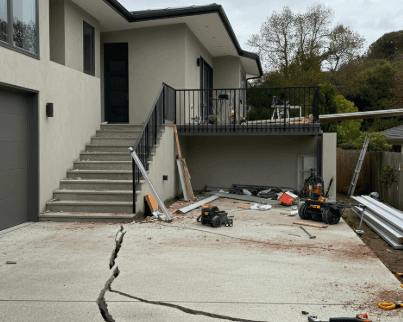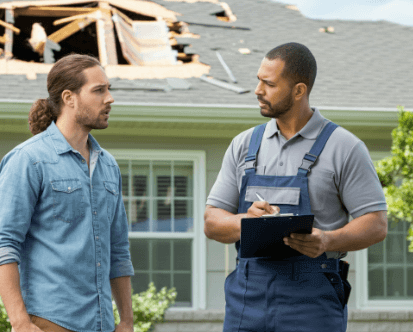Discovering that a hired professional has damaged your home can be incredibly stressful, but knowing what to do next is the key to resolving the issue. When a contractor damages your property in Florida, your first step is to calmly document everything with clear photos and written notes before notifying them in writing. Nationally, property damage from construction and contractor-related incidents accounts for billions in losses each year, but most disputes are resolved through insurance or direct negotiation. Florida law provides homeowners with several paths to recovery, as licensed contractors are typically required to carry general liability insurance to cover such accidents. Seasoned real estate investors and direct cash buyers, Steve Daria and Joleigh, have witnessed firsthand the overwhelming burden that repair disputes often place on homeowners. They offer a practical alternative by allowing you to purchase properties as-is, bypassing the hassle of managing repairs and claims. If you’re facing a situation where a contractor damages your property in Florida and you’re unsure of your next move, explore all your options. Book a free, no-obligation discussion with Steve Daria and Joleigh today to get expert advice and a potential solution.
Understanding Your Rights as a Property Owner
As a property owner in Florida, it’s vital to know the legal protections and rights afforded to you:
Contractor Standards
Contractors in Florida must adhere to stringent standards to prevent negligence and ensure quality workmanship.
These standards are designed to protect property owners by setting clear guidelines for construction practices and contractor responsibilities.
Adherence to these regulations helps maintain a high level of professionalism and accountability within the industry.

Compensation Rights
If a contractor damages your property, you have the right to seek compensation for the repairs and any associated costs.
This compensation can cover the expenses of fixing the damage, as well as any additional costs incurred due to the contractor’s negligence.
It’s important to document all damages and related expenses thoroughly to support your compensation claim.
Construction Lien Law
Florida’s Construction Lien Law allows property owners to withhold payments until the contracted work is completed to their satisfaction.
This law provides an added layer of protection by ensuring that contractors fulfill their obligations before receiving full payment.
It empowers property owners to address any issues with the work quality or project completion, giving them leverage to ensure the job is done right.
Contractor Liability
Contractors bear legal responsibility for any damage they cause during their work.
This liability means they are accountable for repairing any damages and compensating for any related losses.
The extent of this liability should be clearly outlined in your contract with them, specifying what damages are covered and the process for addressing them.
Get An Offer Today, Sell In A Matter Of Days
Insurance Coverage
Most contractors carry liability insurance to cover property damages that may occur during their work.
This insurance is designed to protect both the contractor and the property owner in times of accidental damage.
Before work begins, it’s crucial to verify that your contractor has adequate insurance coverage by requesting and reviewing their insurance certificate.
The Florida Homeowners’ Construction Recovery Fund
In situations where a contractor’s insurance is insufficient or non-existent, Florida residents can turn to the Florida Homeowners’ Construction Recovery Fund for assistance.
This state-run fund is designed to provide financial relief to homeowners who have suffered property damage due to contractor negligence or misconduct.
To qualify for compensation, homeowners must meet specific eligibility criteria and provide evidence of the damage and the contractor’s fault.
Examples of Property Damage
Here are common examples of property damage that may occur during construction or renovation:
- Structural Damage: Cracks in walls or foundations. Damage to support beams or load-bearing walls.
- Water Damage: Leaks or flooding due to improper plumbing installation. Mold growth resulting from water intrusion.
- Electrical Damage: Faulty wiring causing power outages or fire hazards. Damage to existing electrical systems during construction.
Steps to Take When a Contractor Damages Your Property in Florida
If you find yourself in a situation where a contractor damages your property in Florida, follow these steps to address the issue effectively:
- Record the Damage: Take clear photos and videos of the situation, capturing multiple angles and close-ups. Document any relevant details, such as dates and times of discovery.
- Notify the Contractor: Inform the contractor immediately about the damage. Provide a detailed description of the damage along with supporting documentation.
- Review Your Contract: Refer to your contract to understand clauses related to property damage and the contractor’s obligations.
Legal Recourse for Property Damage
If the contractor fails to address the damage adequately, consider the following legal options:
- Mediation and Arbitration: These methods involve a neutral third party to help resolve disputes and can be less adversarial, preserving relationships between property owners and contractors.
- Small Claims Court: For damages up to $8,000, small claims court offers a straightforward legal avenue for property owners.
- Hiring an Attorney: An attorney offers specialized guidance, navigates the legal system, and advocates for you to secure rightful compensation.

Tips for Preventing Property Damage
Prevention is essential in protecting your property during construction or renovation projects.
Know these tips to minimize the risk of damage:
Choose a Reputable Contractor
- Conduct thorough research on potential contractors.
- Check credentials, experience, and reviews from previous clients.
- Verify licenses and ensure adequate insurance coverage.
Outline Clear Expectations in Your Contract
- Clearly define expectations regarding work quality and procedures.
- Include specific clauses related to property damage, repairs, and dispute resolution.
Conduct Regular Inspections
- Monitor the progress of the work through regular inspections.
- Address any concerns promptly to prevent issues from escalating.
Frequently Asked Questions
Many homeowners have queries about property damage caused by a contractor in Florida.
Here are some:
What should I do if my contractor refuses to fix the damage?
Review your contract terms.
Consider mediation, arbitration, or legal action.
Can I withhold payment if a contractor damages my property?
Review your contract and seek legal advice.
How can I verify that a contractor has adequate insurance coverage?
Request a copy of their insurance certificate.
Contact the insurance provider to confirm coverage details.
Takeaway
- Document the Damage: Capture immediate, detailed photographic and video evidence of the damage from various angles, noting the precise date, time, and a clear description of the incident. This evidence is critical for any claims you might file and is the first step when a contractor damages your property in Florida.
- Notify the Contractor: Notify your contractor of the damage formally in writing, such as through an email or certified letter, and reference the terms in your signed contract regarding liability and insurance. Your contract is your primary guide to resolving disputes and should outline the process for making a claim.
- File an Insurance Claim: Request the contractor’s general liability insurance information to file a claim directly with their provider for the necessary repairs. If they are uncooperative or uninsured, you may need to file a claim under your own homeowner’s policy, but be aware of your deductible.
- Escalate if Necessary: If direct communication fails, send a formal demand letter outlining the damages and costs before considering mediation or small claims court for resolution. A police report is only necessary if you believe the damage was intentional and criminal, not accidental.
- Consider Practical Alternatives: Dealing with a situation where a contractor damages your property in Florida can be overwhelming. If the repairs are too extensive, consider practical alternatives, such as contacting renowned real estate investors Steve Daria and Joleigh for a fair-as-is cash offer.
**NOTICE: Please note that the content presented in this post is intended solely for informational and educational purposes. It should not be construed as legal or financial advice or relied upon as a replacement for consultation with a qualified attorney or CPA. For specific guidance on legal or financial matters, readers are encouraged to seek professional assistance from an attorney, CPA, or other appropriate professional regarding the subject matter.

